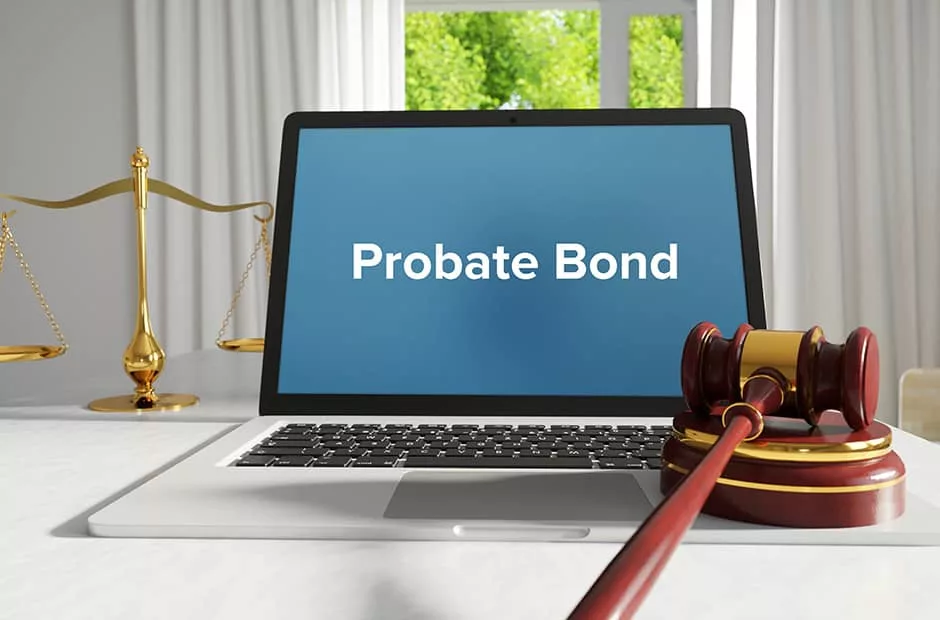If you’ve recently lost a loved one in Alabama and are settling their estate through probate, you may have heard mention of a probate bond.
As probate lawyers, our team regularly guides families through the probate process, helping them to determine whether a bond is required, secure the appropriate bond, and provide peace of mind during a challenging time.
In this article, we’ll explain what a probate bond is, when it’s required in Alabama, and how it helps safeguard the interests of beneficiaries and creditors.
Understanding Probate Bonds in Alabama
A probate bond, also known as a fiduciary bond, is a type of surety bond that serves as a safety net for beneficiaries and creditors during the administration of an estate.
In Alabama, the bond is designed to ensure that the executor or administrator (the person responsible for managing the estate) fulfills their legal duties and handles the estate’s assets according to the decedent’s wishes and state law.
Here’s how probate bonds work in Alabama: the executor or administrator obtains the bond from a surety company, which essentially acts as a guarantee of their performance. If the executor or administrator mismanages the estate, fails to follow the terms of the will, or violates their fiduciary duties, beneficiaries or creditors can file a claim against the bond to seek reimbursement for any losses incurred.
When is a Probate Bond Required in Alabama?
In Alabama, probate bonds are not always mandatory. However, there are certain circumstances under which the court may require a bond to safeguard the interests of the estate, its beneficiaries, and creditors. A probate bond may be necessary:
- When the decedent’s will does not explicitly waive the requirement for a bond
- When the court determines that a bond is needed to protect the estate’s assets and the rights of beneficiaries or creditors
Several factors influence the court’s decision to require a probate bond, such as:
- The value and complexity of the estate
- The relationship between the executor or administrator and the beneficiaries
- Any concerns about the executor or administrator’s ability to manage the estate properly
It’s important to note that even if a bond is initially waived, the court retains the right to require one later if circumstances change or concerns arise about the management of the estate.
Types of Probate Bonds in Alabama
There are several types of probate bonds used in Alabama, each serving a specific purpose:
- Executor Bonds: These bonds are required for executors named in the decedent’s will. They ensure that the executor carries out their duties in accordance with the will and Alabama law.
- Administrator Bonds: When a person dies without a will (intestate) or the named executor is unable or unwilling to serve, the court appoints an administrator to manage the estate. Administrator bonds guarantee that the court-appointed administrator fulfills their legal obligations.
- Trustee Bonds: If the decedent’s estate involves a trust, the trustee may need to obtain a bond to ensure they manage the trust assets responsibly and in line with the trust’s terms and Alabama law.
Obtaining a Probate Bond in Alabama
To obtain a probate bond in Alabama, the executor or administrator must follow these steps:
- Determine the required bond amount based on the value of the estate’s assets. In Alabama, the bond amount is typically equal to the value of the estate’s personal property plus one year’s worth of estimated income from real property (Alabama Code § 43-2-851).
- Apply for the bond through a surety bond company. The applicant will need to provide personal and financial information, as well as details about the estate.
- Submit the bond to the probate court for approval. Once approved, the bond remains in effect until the estate is settled and the court releases the executor or administrator from their duties.
The cost of a probate bond in Alabama varies depending on several factors, including:
- The bond amount required
- The applicant’s credit score and financial history
- The complexity and risk associated with the estate
Generally, the premium for a probate bond is a percentage of the total bond amount, which the estate typically pays as an administrative expense.
The Importance of Probate Bonds in Safeguarding Estates
Probate bonds play a crucial role in protecting the interests of beneficiaries and creditors during the estate administration process. By requiring a bond, the court ensures that the executor or administrator is held accountable for their actions and that the estate’s assets are managed responsibly.
Some key benefits of probate bonds include:
- Promoting transparency and accountability in estate administration
- Providing a financial safety net for beneficiaries and creditors in case of mismanagement or misconduct
- Encouraging executors and administrators to fulfill their legal duties diligently
Failing to obtain a required probate bond in Alabama can lead to serious consequences, such as delays in the probate process, legal penalties, and even removal of the executor or administrator from their position.
Consult with Our Experienced Alabama Probate Attorney
Navigating the probate process and understanding the requirements for probate bonds can be complex and overwhelming. At The Law Offices of Brenton C. McWilliams, our knowledgeable probate attorneys are here to guide you through every step of the process.
We can help you understand your specific probate bond requirements, ensure compliance with Alabama law, and protect the interests of your loved one’s estate.
If you have questions about probate bonds or any other aspect of estate administration in Alabama, don’t hesitate to contact our law firm. Our legal team is dedicated to providing the support and guidance you need during this challenging time.




